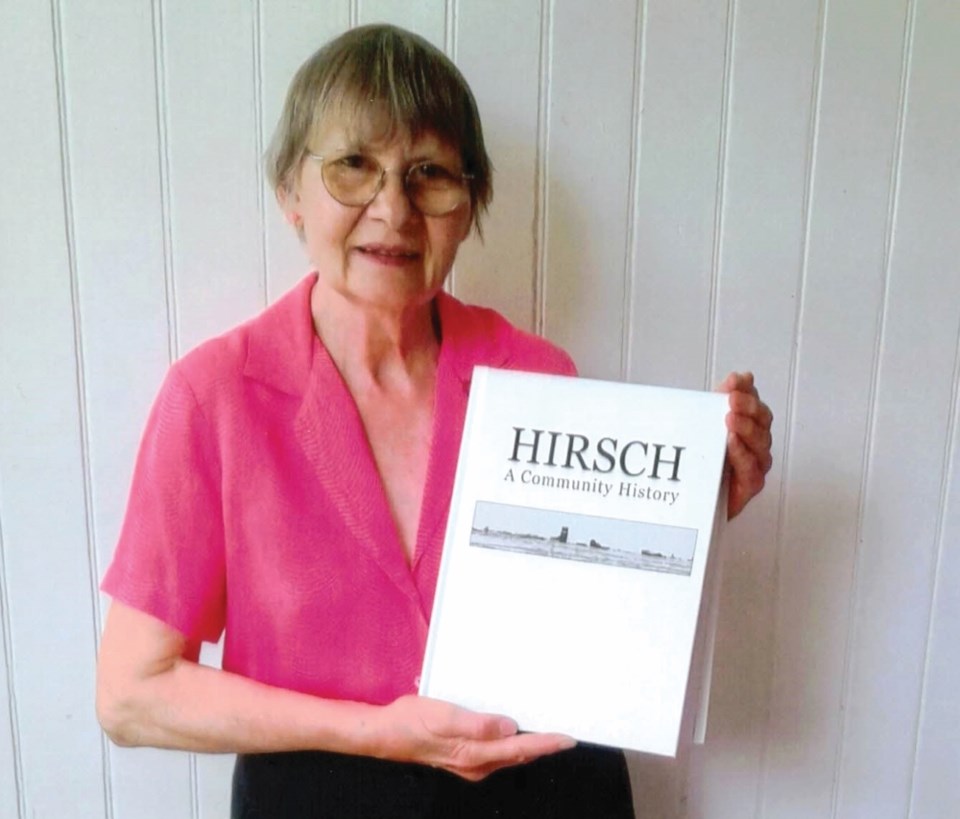HIRSCH - Gail Skikevitch spent nearly 20 years working on Hirsch: A Community History – a new book that documents the community's history and celebrates those who have lived in what was once a Jewish colony.
Skikevitch started working on the project in 2005 after a reunion for Bienfait Weldon School, held as part of the Saskatchewan centennial celebrations. The Hirsch book went to print in early May, and since it was released, Skikevitch said it has had a great response.
"People were writing history books at that time [in 2005]. It was a popular project. But nothing had been done about Hirsch," she said in an interview with the Mercury and SaskToday.
After taking a break for a few years to tend to family matters, Skikevitch decided she should finish the project, because if she didn't, it likely wouldn't happen. She started calling and interviewing people again, and continued her work until the book was published.
The finished product is just over 1,000 pages, which might seem like a lot for what is now a hamlet, but Skikevitch noted Hirsch was once a thriving town that was bigger than Estevan.
"I was concerned in the beginning that I wouldn't have enough information, and of course because a lot of the people in that generation had passed away, I couldn't get in touch with them anymore," she said.
Half of the book is about the history of the area, touching on similar topics as most community history books. The second half features stories of the different families. She also spoke with people who still live in the community, and Skikevitch said their stories are important.
"There is much, much more that I would have liked to have put in. I would have liked to have had more people doing research on those topics, but that was a bit of a challenge because I'm not living in the community," said Skikevitch, who now resides in Ontario.
"While you can use the internet and email and so on to do almost anything these days, I think it makes a difference when you can connect first-hand with people in the community, and that way I might have been able to get more information about different things, although then it probably would have had to have been put into two books, and that would have been another story altogether," said Skikevitch.
She was familiar with Hirsch's history and its deep Jewish roots before embarking on the project, but she still learned a lot during her research. She was particularly interested in how the schools were set up, and how the Hirsch school was struggling because it had different locations.
"In the beginning, the school areas were mapped out, but then, depending on the population, those schools may or may not have been filled," said Skikevitch, who went to a two-room school in Hirsch when it was new.
When she read the Frobisher history book, the Hirsch school was briefly mentioned. Skikevitch went to the archives in Regina, and found letters by a rabbi who was instrumental in getting a school moved into Hirsch.
She also pointed out there was also a discussion among the Jewish people in the area who had to travel further to get to school, whether it be walking or by horse.
Those she talked to, particularly from the older generation, found the history book refreshed their memories about things they did in their childhood and people they knew.
"One of the goals of the history book committee is to enable that generation to have that opportunity, because unfortunately many of them now have passed away, and so they need to pass this information onto their children," said Skikevitch.
People wanted to know about their families' roots, even if they are no longer in the area.
Skikevitch wrapped up her research on the book about a year ago. She had been trying to update information, such as if someone passed away.
"I realized I really had to stop doing that, because you'll never finish then, because things are continually being updated."
Some people died between when she stopped compiling data and when the book was released.
"I wanted it to be as updated as possible, and maybe someone will write a second book," said Skikevitch, who suggested a second installment should be completed by someone who lives in the community.
"It could be an ongoing project."
She thanked everyone who agreed to share their story and be part of the project, and who recognize the value of a history book for a community.
"Even when the work was sort of overwhelming, it made it worthwhile in the end," she said.
Skikevitch said it's one of the largest history books that Friesen Printers has published. The company has completed a lot over the years, including the Estevan history book, A Tale that is Told.
Most of the copies of the Hirsch book have been distributed through Friesen. She has the balance of the copies, so if someone wants to purchase the book, they can email her at [email protected].



